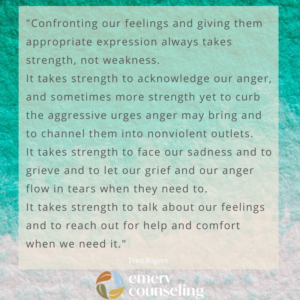
I love this quote. It’s incredibly important to have healthy outlets and adaptive ways of expressing our emotions. If we don’t, they can come out sideways causing additional duress. However, I would like to take this a little further.
Healthy expression of emotion is one area that deserves great attention and development. But what if we better understand what our feelings are actually trying to tell us?
As much as it takes strength to have an appropriate expression of our emotions, it also takes humility and trust to better understand what our feelings are trying to say. What needs are our emotions alerting us to?
When we can grow into readily identifying what we are feeling, we can utilize our feelings as a tool that can guide and instruct us to our needs. If I am sad I may be in need of comfort. If I am afraid or anxious I may need safety. If I am angry I may have been wronged and need to be heard.
Often, because of life experiences, especially early in life when the groundwork is being laid, wires can get crossed. Take sadness as an example. I believe one need that sadness is intended to alert us to, is the need of being comforted. Depending on our early experiences around sadness, we may have been taught to ignore feeling sad and were unknowingly trained to “put on a happy face”. If we now experience a situation in the present time that naturally draws up sadness, or even disappointment, rather than feeling dad, we may immediately feel ashamed because it’s “not ok” to feel sad. Rather than seeking out comfort, we may find ourselves hiding from engaging in life or relationships because a dissonant need has emerged. If we have learned to discount our emotions, we have also been wired to devalue our needs and this in turn, diminishes our self-worth.
 If we don’t know what we need, understandably, we will take the most familiar option. In order to relearn a “new familiar,” it’s important to process confusing feelings.
If we don’t know what we need, understandably, we will take the most familiar option. In order to relearn a “new familiar,” it’s important to process confusing feelings.
This allows us to better understand our unmet needs and develop intentional plans to practice getting them met.
In learning to identify what we are feeling we can also learn to better regulate those emotions by tending to our needs. It takes practice and we need support. Sometimes it may be more painstaking and take time to sift through the immediate feeling in order to discover the real need. A person may first have to express it, let it out in a healthy way, before being able to uncover the actual underlying needs present.
I believe it begins with getting back to some fundamentals of feelings and needs.
This is where counselors can be incredibly helpful. A safe person whom we can be vulnerable and explore, unpack, process, and gain insight and clarity to our most muddled feelings and malnourished needs. When we can better acquaint ourselves with our feelings, when we readily understand what they are really trying to tell us, we can be more empowered in distress and feel more confident about understanding our needs and getting them met.


